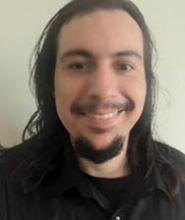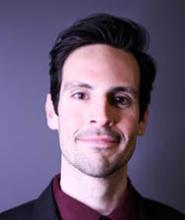Debra Beight, MA, MSc
Email: debra.beight@case.edu
Debra Beight is a third-year Ph.D. student and a co-instructor for BETH 371, Advanced Bioethics. Her research interests encompass LGBTQ+ health with special attention on sexual and reproductive health for transgender and intersex persons, gender recognition policies for transgender persons in the EU, and health care access disparities for transgender immigrants and refugees in Sweden. She has recently presented her research on fertility preservation for intersex infants at UTMB’s Reproductive Ethics conference. In April 2023, she presented for the third time at the EPATH Transgender Health conference. She is currently working on a manuscript focusing on futurity and intersex infants and children. Debra received a BA from The Ohio State University, double majoring in Communication Analysis and Women’s, Gender, and Sexuality Studies, a Master of Medical Science with a major in Public Health from Lund University in Sweden, and an MA in Bioethics from The Ohio State University.
Courses Taught
- BETH 371. Advanced Bioethics
Publications
Exploring the Needs, Expectations, and Realities of Mental Healthcare for Transgender Adults: A Grounded Theory Study on Experiences in Sweden (2018): Transgender Health: www.liebertpub.com/doi/full/10.1089/trgh.2017.0033
Zachary Landeros, MA
Email: zachary.landeros@case.edu
Zachary Landeros is a doctoral student in the Department of Bioethics at Case Western Reserve University School of Medicine. He received his BA in Philosophy from New Mexico State University in 2019 and his MA in Applied Philosophy and Ethics from Texas State University in 2021.
Courses Taught
BETH 271. Bioethics Dilemmas BETH 271 introduces various controversial bioethical issues to students, as well as methods for approaching said issues.
Research Interests
- Normative Aspects of Decision Making Under Risk and Uncertainty (at both the clinical and policy levels)
- Application of Moral Epistemology and Meta-Ethics to the Normative Methods in Bioethics
Sean Eli McCormick, MA
Email: sean.mccormick@case.edu
Sean Eli McCormick is a PhD student in the Department of Bioethics at Case Western Reserve University School of Medicine. He has served as a Senior Lecturer in the Department of Philosophy at the University of Akron since Fall 2022, and as an Instructor in the Department of Philosophy and Religious Studies at Cleveland State University since Fall 2016. He is a member of the University Hospitals of Cleveland Medical Center Ethics Committee (July 2014-present), University Hospitals Rainbow Babies & Children’s Hospital Ethics Committee (October 2021-present), and University Hospitals of Cleveland Medical Center Patients Without Proxy (PWP) Subcommittee (March 2015-present). He additionally serves as a peer reviewer for Quality Matters, an organization that certifies online and blended courses for quality standards across the country.
As an Instructor at Cleveland State University, Mr. McCormick has taught courses in reasoning and argument, morals and rights, normative ethics, philosophy in science-fiction and fantasy, bioethics and the law, foundations of bioethics, and introductory courses in both philosophy and religious studies. As a Senior Lecturer at The University of Akron, Mr. McCormick has taught courses in normative ethics, biomedical ethics, and introductory courses in philosophy.
At Case Western Reserve University, Mr. McCormick has served as the course director for "Perspectives on Health: Introduction to Medical Humanities and Social Medicine," a survey course designed to give students a broad overview of medical humanities and medical social sciences. The course introduces students to a series of guest lecturers from around the area who specialize in various fields of medical humanities and social medicine to discuss the epistemology, methods, and theories of their disciplines. Students also have the opportunity to visit area museums for tours related to medical history and art observation.
Teaching Interests
Teaching Philosophy
My primary goal as an educator is to provide a classroom that is inclusive and engaging, and that invites students to be critical thinkers and active learners as opposed to passive recipients of information. As a constructivist, I believe that learners best acquire knowledge through experiential learning and discussion, building upon their previous experiences and beliefs. It is my goal to empower students and give them the confidence to succeed, as well as to share their own perspectives with fellow classmates. To this end, I employ the techniques of active learning, problem-based learning, the Socratic method, and small group learning in my courses. My classes usually consist of a hybrid of engaged lectures, utilizing the shared dialogue of the Socratic method, and problem-based learning in small groups discussing case studies and ethical dilemmas.
Courses Taught
- BETH 210 Intro Soc Med & Med Humanities(40520)
- Research Interests
- Disability Bioethics
- Population and Community Health
- Transplant Ethics
- Professionalism and Boundaries
- Emerging Technologies
Research Projects
I am currently working on the CWRU at Midtown Population and Community Health Initiative as a graduate research assistant and community engagement coordinator with faculty from across the University, including the Prevention Research Center for Healthy Neighborhoods and the Mary Ann Swetland Center for Environmental Health. I am currently organizing and analyzing data from listening sessions soliciting feedback from stakeholders in the community, identifying and engaging with peer institutions, identifying candidates for community experts-in-residence, and engaging with community business leaders.
I am also working as a research associate with members of the Health Humanities Consortium’s Curriculum and Assessment Committee to engage health humanities educators around the nation in discussions about the content, skills, and values that are central to health humanities programs. In this role, I am working on focus group transcript verification and qualitative coding.




